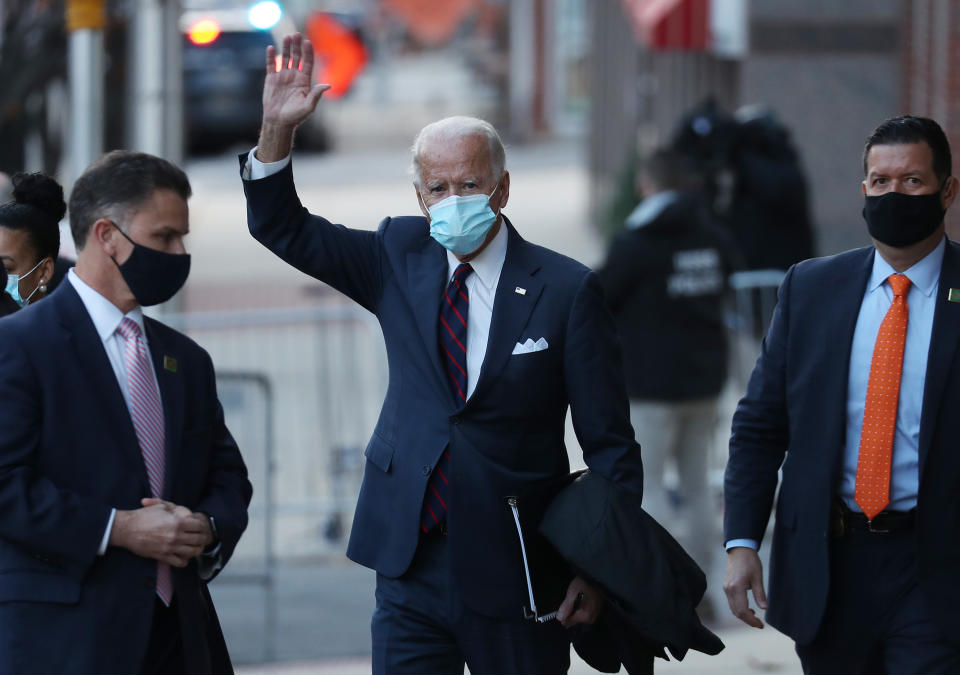‘Hiding in the shadows’: What Biden presidency means for Australia
In mid-December the electors of the US election system will meet and make it official: Joe Biden will be certified as the next president of the United States.
But what that means for Australia might not be so certain.
The US is Australia’s most important military and cultural ally, but its place in the world has changed since Donald Trump capitalised on a growing tide of nationalism and American isolationism in 2016.
While a Biden presidency is widely expected to be a positive for Australia’s alliance with the US, it could leave Australia out in the Indo-Pacific cold, says UNSW’s Dr William Clapton.
“We don’t know enough yet what a Biden presidency will do,” he told Yahoo News Australia.
“The big issue I think for Australia is not US engagement in the Indo-Pacific per se, but exactly what sort of engagement we’re going to get.”

The 77-year-old Biden will enter the White House with a wildly out-of-control pandemic raging in the country and a bitterly divided population, some of whom don’t believe his election was legitimate.
“The question is the extent to which the domestic situation in the United States is going to affect its foreign policy,” Dr Clapton said. “The division and polarisation that we have seen in the United States over the last five or six years isn’t likely to go away.
“The concern is that those domestic distractions and that domestic discord is going to make it very difficult to focus on, and contribute the necessary resources to deal with emerging strategic challenges in the Indo-Pacific region.”
On China
During a call between Australian Prime Minister Scott Morrison and Biden last week, both leaders said the pair discussed maintaining a secure and prosperous Indo-Pacific. Translated from diplomatic speak, that essentially means managing an increasingly assertive and aggressive China.
From a US standpoint, “strategically, I’m not sure we’ll see massive changes or differences,” Dr Clapton said.
“Trump has been relatively more isolationist than other presidents but that hasn’t stopped the US from conducting freedom of navigation exercises in the South China Sea and putting pressure on China over the issue [of expansion in the South China Sea].”
'Shameful': Fury erupts over alleged US election recount ploy
'Wild card': US quietly makes unprecedented move against China
While America’s approach will likely be less pugnacious compared to what we’ve seen under Trump and secretary of state Mike Pompeo, Dr Clapton expects the US to continue to conduct shows of force in the region to contain China.

One point of tension will be China’s stated efforts to reclaim Taiwan, which is shaping up to be a major test for the incoming US president.
On climate change
Biden’s promise to tackle global warming puts Australia in an awkward position.
When it comes to meaningful climate change action, “Australia has been able to hide in the shadows of the Trump administration,” Dr Clapton said.
“Our government over the last few years has been quite circumspect when it comes to climate change science and has shown a fairly significant unwillingness to move strongly on climate change. The Morrison government at the moment ... has been able to sit next to the United States and draw on US support in terms of inaction.”
Biden will join Australia’s other major trading partners including China, the UK and Japan in committing to net zero emissions by 2050 – something the Morrison government has steadfastly refused to do.
“That is only going to further isolate Australia when it comes to climate change within the international community,” Dr Clapton warned.
Ahead of the election, former Australian prime minister Kevin Rudd made similar statements, telling Yahoo News Australia Trump “made it easier for Morrison to frankly get away with blue murder in terms of what needs to be done [on climate change].”

On military conflict
The Obama administration, in which Joe Biden was vice president, was criticised for its heavy use of drone strikes on targets in the Middle East – a feature which has been considerably more absent during the Trump years, aside from the notable assassination of Iranian Major-General Qasem Soleimani.
“There were two opposed criticisms or tensions where Obama and Biden were seen as being too militaristic but then also being too soft when it came to China,” Dr Clapton said.
“Where that goes in the next two years is going to be interesting. I would expect the Biden administration to be broadly in line with the foreign policy and ideological disposition of Obama.”
While Trump is trying to pull troops out of Afghanistan before he vacates the White House, Biden will likely be a friend of the country’s much talked about military-industrial complex and its myriad military engagements in foreign countries.
On trade
It’s likely that Biden will try and reset trade relations with China, Dr Clapton said.
“We will probably see a less contentious and less conflictual approach to trade which will very much be in Australia’s interest,” he said.
While that’s regarded as a positive thing for global markets, normalising trade between China and the US comes at a time when China is increasingly using trade as a weapon against Australia by closing off its market. A more open US market could bolster its ability to continue such a diplomatic vendetta against the Morrison government.
Earlier this week, Australia signed up to an ambitious trade deal between 15 Asia-Pacific economies, in what could become the world's largest free trade agreement. The deal should help improve the country’s strained relations with China, Australia's Trade Minister Simon Birmingham said.
Joe Biden will take office on January 20.
Do you have a story tip? Email: newsroomau@yahoonews.com.
You can also follow us on Facebook, Instagram and Twitter and download the Yahoo News app from the App Store or Google Play.



